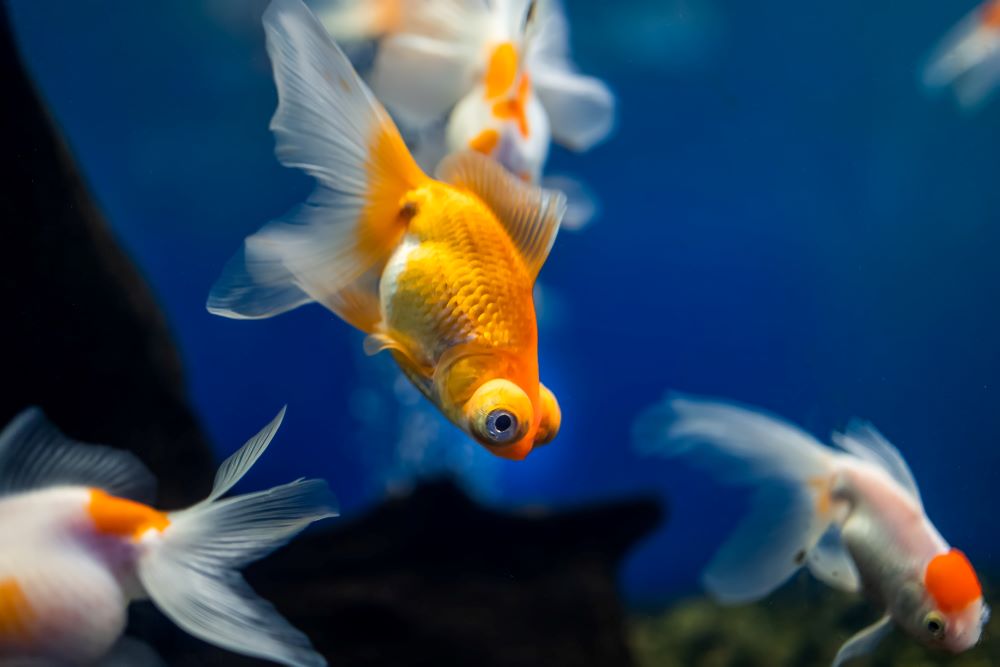Goldfish is a very popular species among aquarists, especially as an alternative to more aggressive ones like Betta. However, keeping the former can quickly exert pressure on your wallet, especially when it concerns catering to their specific dietary needs.
A can of Goldfish flake food can cost anywhere from $4 to $12. But then, betta food is much cheaper than goldfish food, typically costing little more than $2 a can. So, it’s natural that you might have considered treating your goldfish to some betta chow to save costs.
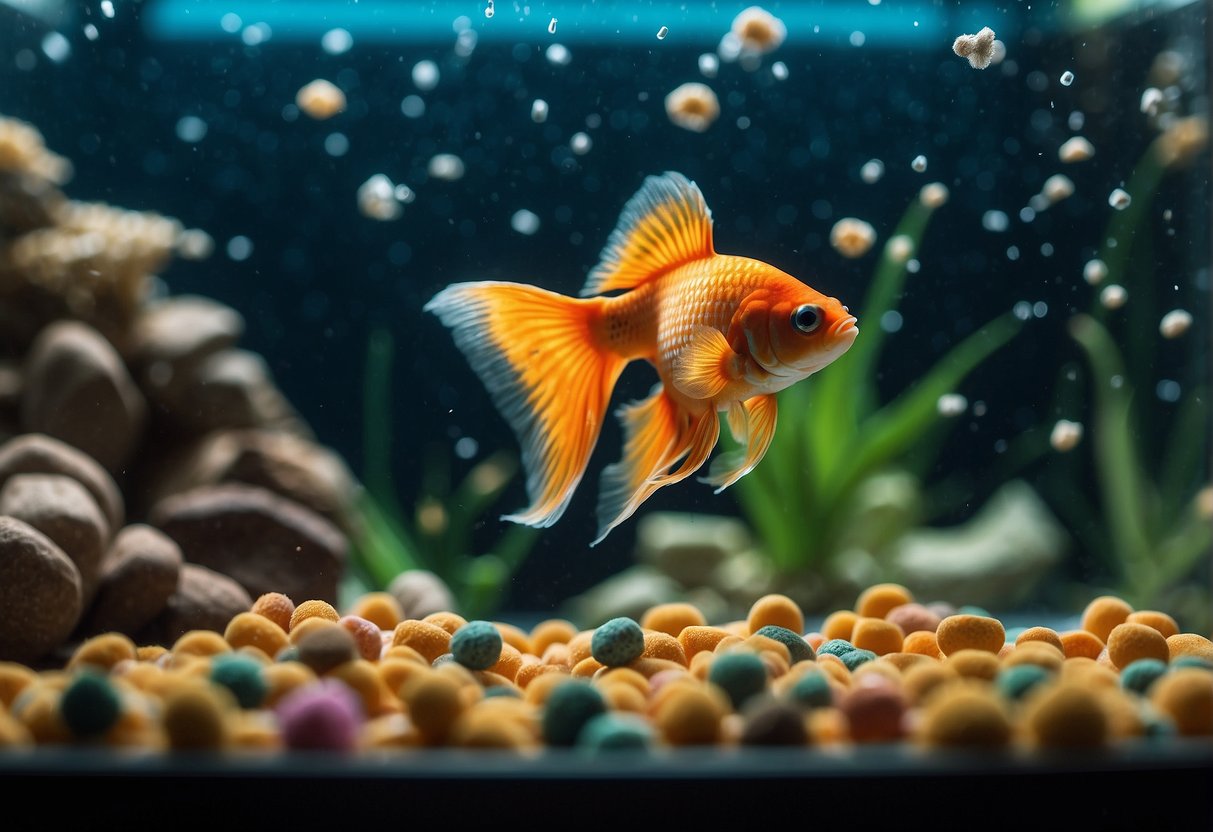
The question arises: Can goldfish eat betta food? This article will answer that question comprehensively, discussing everything from the safety of cross-feeding to its short-term and long-term effects on your goldfish. Without further dallying, let’s get right into it.
Contents
Understanding the Diet of Goldfish
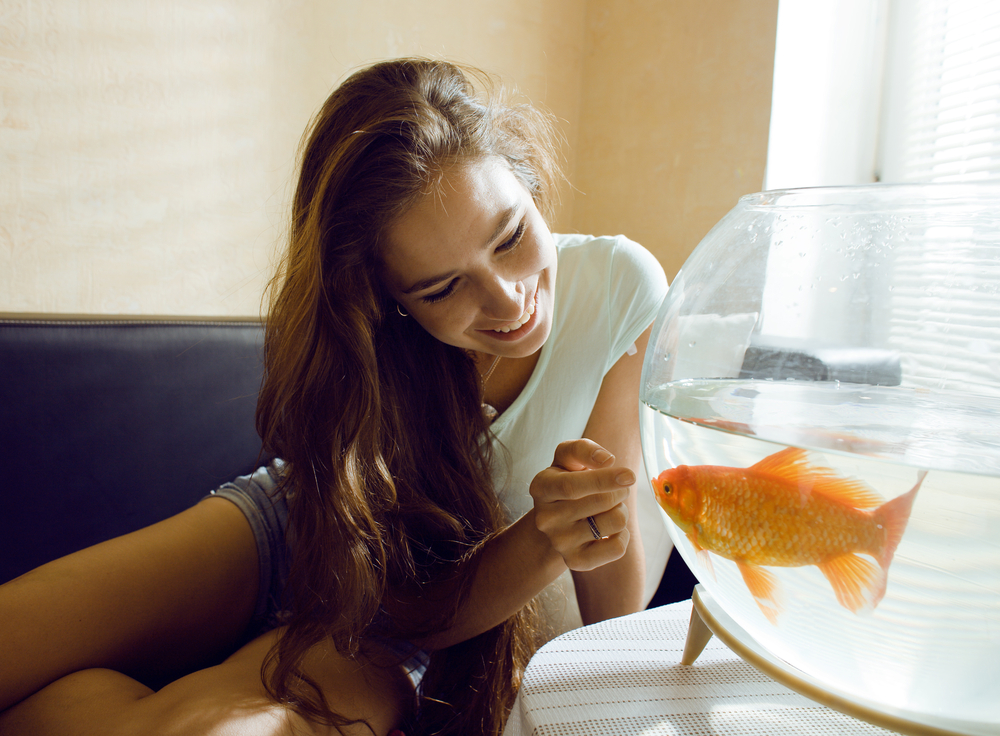
Deciding whether to feed your goldfish betta food requires first understanding what goldfish eat and why. In this section of our guide, we’ll discuss goldfish diet and nutrition and compare it to betta fish diets.
You also shouldn’t miss:
- What to Feed a Goldfish with – The Ultimate Guide.
- How to Ensure Your Goldfish Thrives for 15 Years
- Ranchu Goldfish
Nutritional Needs and Digestive System
Goldfish are omnivorous, which means they can survive on both an animal and plant-based diet. Nutritionally, they require a mix of protein, fiber, and plant matter, unlike carnivorous fish that thrive solely on a high-protein diet.
Interestingly, goldfish don’t have stomachs, so they must eat continuously throughout the day. Due to this unique anatomical feature, the ideal food for goldfish is fiber-rich, thus precluding constipation and making it easy to digest. Here’s a quick summary of all the nutrients your goldfish requires to survive.
- Protein: Essential for growth and maintenance, but should be fed in moderation
- Fiber: Required for a healthy digestive system, found in vegetables and high-quality flake foods
- Carbohydrates: Needed for energy and should make up a good portion of their diet
- Vitamins and Minerals: Vital for immune system health and other bodily functions
Can Goldfish Eat Betta Food? Comparison with Betta Fish Diets
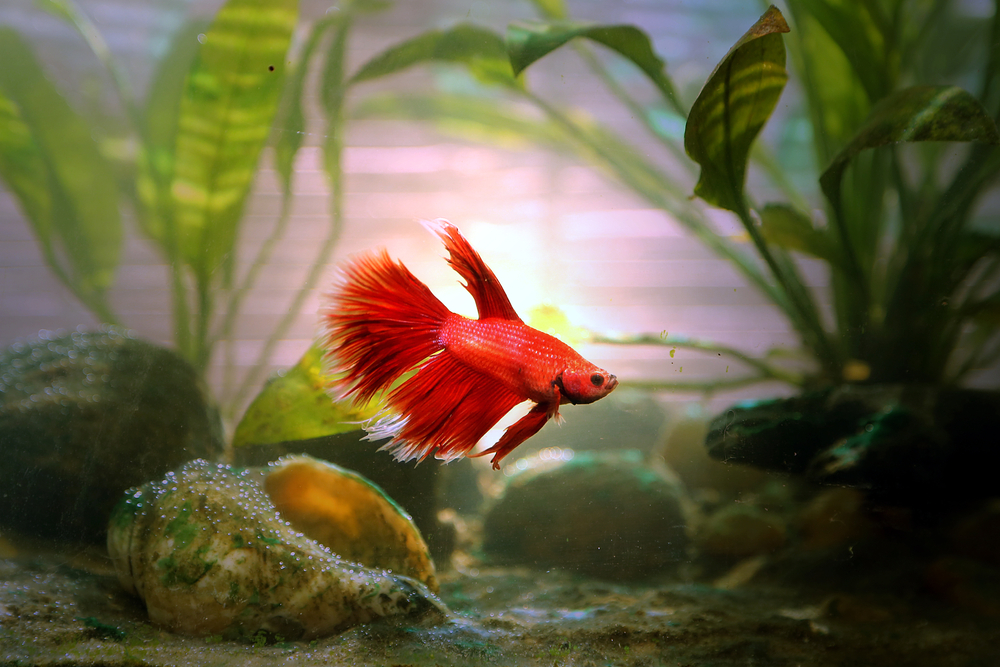
While goldfish are omnivorous, betta fish are obligate carnivores and rely more on animal content. Betta fish diets are, thus, ideally rich in fish or invertebrate-based proteins.
But the quantities goldfish need are far below the level that betta fish require. Eating that much protein can cause health problems for your goldfish, including bloating and impaired kidney function.
So, should you feed your goldfish betta food? The dietary needs of both species overlap enough to allow you to do that. However, the associated health risks and relative composition of betta food, as will be even clearer in a bit, make the practice unsafe.
Analyzing Betta Food Composition
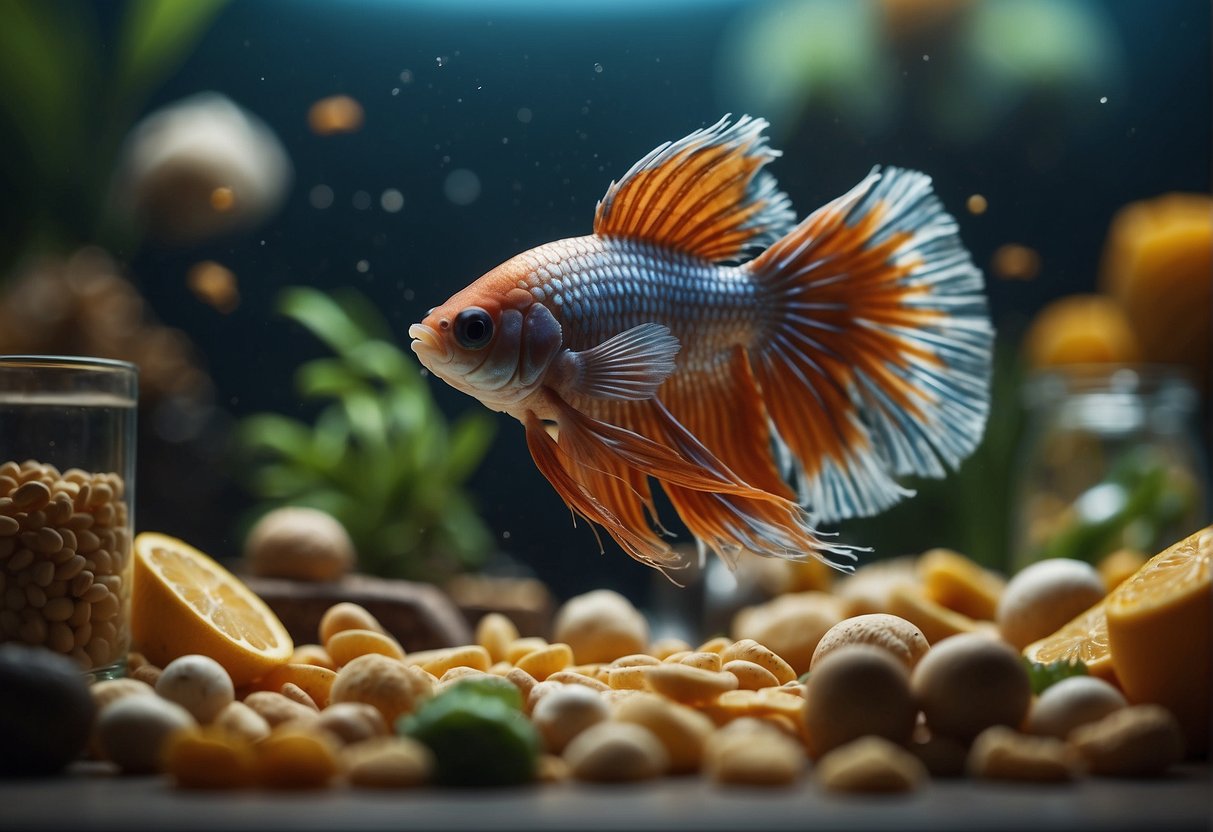
It’s imperative to examine the content of beta and goldfish diets closely, as it’ll help improve your understanding of their nutritional profile and differences.
Protein Content and Ingredients
We’ve mentioned that betta fish, due to their carnivorism, require food with high protein content far above what goldfish require. These protein levels are often up to 55% in specialized betta food and can be higher or lower in live food.
The sources of these proteins are usually fish or shrimp meal, which also provide essential amino acids necessary for betta health. Shrimp meals also enhance food palatability for goldfish, while fish meals are more concentrated protein sources.
Additives and Nutritional Balance
Betta food may consist heavily of proteins, but it also requires a mix of vitamins and minerals that cater to the full spectrum of a betta fish’s nutritional needs. Vitamins A and D3 and minerals like iron, zinc, and manganese are among the most important of these additional nutrients.
Betta fish require these nutrients because lacking them leads to deficiencies. Furthermore, they serve important functions. For example, vitamin C bolsters immune health, and the minerals are vital for metabolism and bone growth.
Potential Risks and Benefits
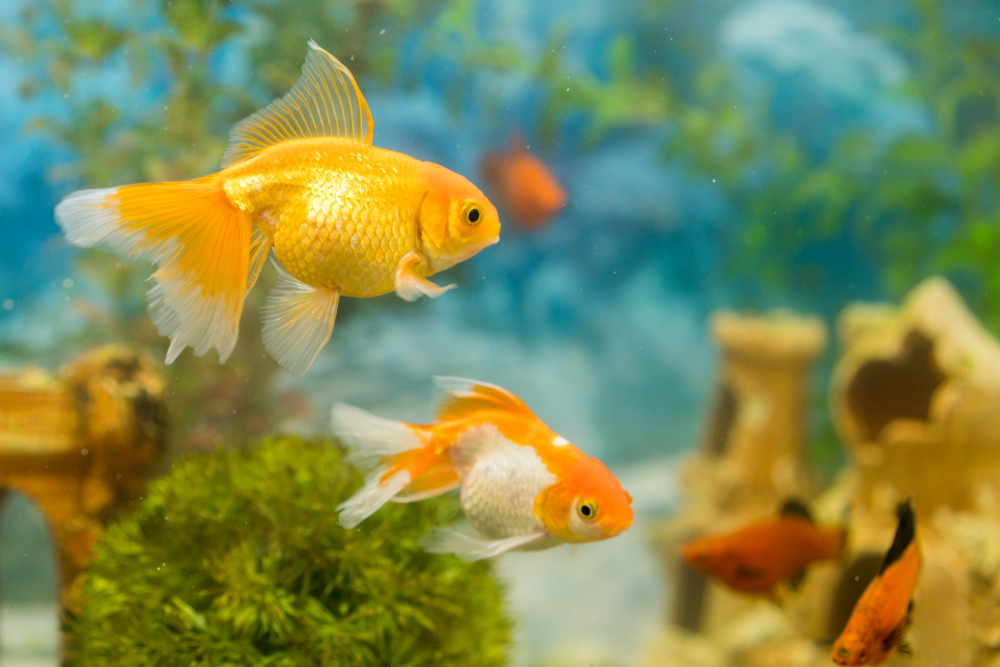
For better or worse, all food has a health impact. Studying how betta food impacts the health of your goldfish is vital when considering having it eat some betta food. So, let’s see these health implications.
Health Impacts on Goldfish
Your goldfish requires higher concentrations of carbohydrates and less protein in their diet, and we know that betta fish require almost the exact opposite.
Still, it’s not like the high protein content in betta food will kill your goldfish or make them sick from just one or two servings—it’s perfectly safe to feed them betta food occasionally.
Instead, the danger comes when you feed them this stuff frequently or for prolonged periods. If you rely on betta food to feed your goldfish, the potential for health problems like bloating, kidney disease, swim bladder disease, and other ailments increases.
Digestive Issues and Suitable Alternatives
Goldfish digestive systems are not built to digest high-protein diets, so they tend to experience digestive problems when eating such diets. Suppose you feed your goldfish some betta food for a while; in that case, over time, it may begin to experience constipation and a build-up of waste, further deteriorating water quality and potentially leading to more ailments.
Feeding Practices for Goldfish
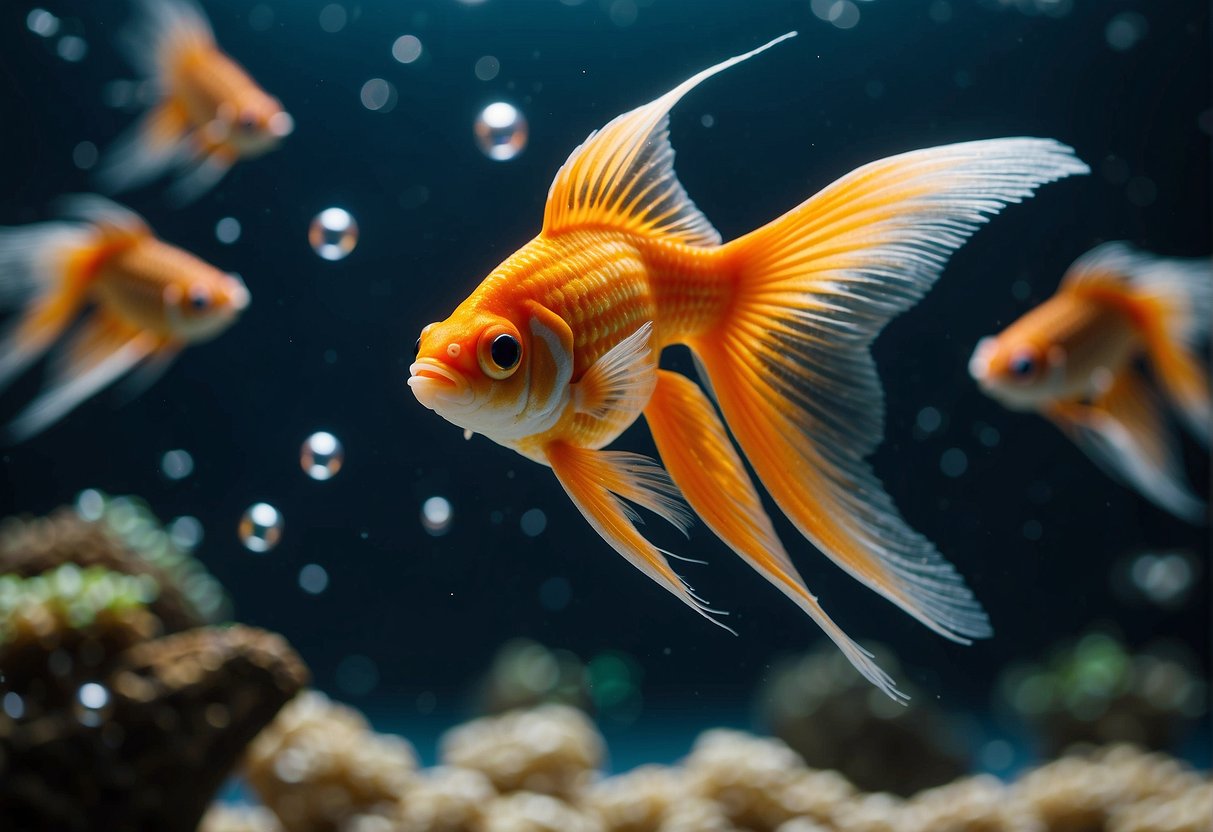
From what we’ve discussed so far, it should go without saying that feeding your goldfish the right food is crucial. Feeding right involves giving the correct type of food in the right quantities and frequency. So, in this section, we’ll discuss how much, how frequently, and what variety of foods to feed your goldfish.
Frequency and Portion Sizes
The ideal frequency for feeding a goldfish is three times daily, but be careful not to overfeed them. A good rule of thumb for portion sizes is to offer as much food as they can consume in two minutes. Given the water quality issues and health problems that tend to arise from excess food in the water, you need to monitor your goldfish’s eating closely to know how much they can eat in that time. You use the following schedule to guide the feeding frequency and quantity.
- Morning Feed: A small pinch of flakes or pellets
- Afternoon Feed: Another small portion of the staple diet
- Evening Feed: If I choose to feed a third time, it’s a light serving of vegetables or live food
Live Food, Frozen, and Plant Choices
To satisfy the varied dietary needs of goldfish, you need to introduce live food and plant matter into their diet. Live food, such as brine shrimp or bloodworms, offers high protein content, which is beneficial but should be in moderation. Here’s how you can incorporate these options:
- Live Food: Served sparingly, maybe a couple of times weekly
- Frozen Food: Thawed and served as an alternative to live food; ensures a parasite-free option
- Vegetables: I offer blanched peas or lettuce, promoting good digestion and mimicking their natural diet
Choosing Goldfish Food
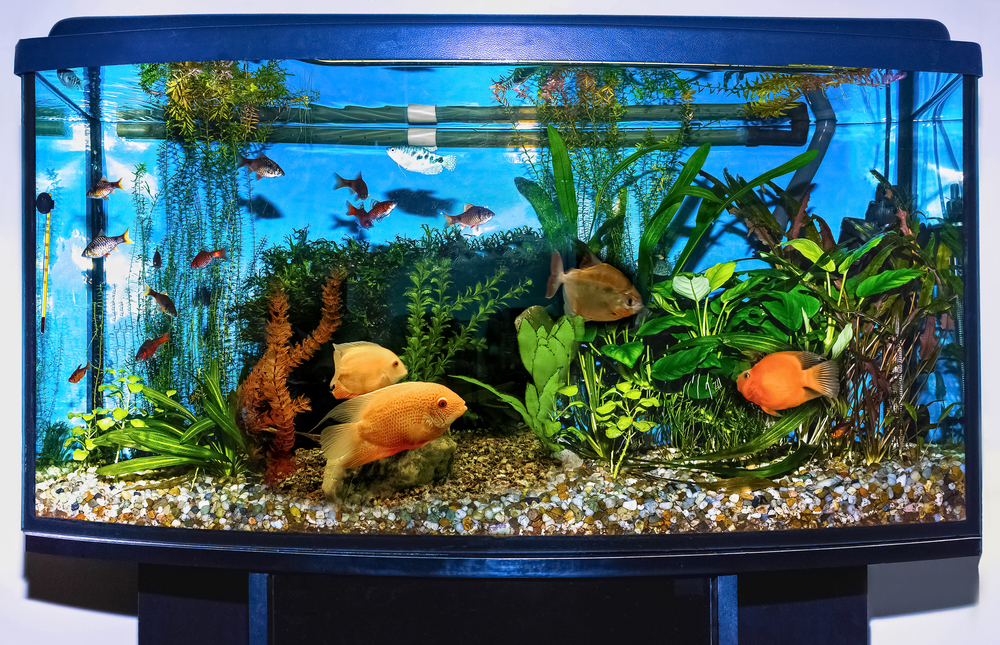
Having understood your goldfish’s nutritional needs, it’s time to choose what to feed them. What types of food should you have considered? Let’s discuss conventional goldfish foods and alternatives.
Specifics of Goldfish Pellets and Flakes
Goldfish pellets and flakes are the most popular staples for goldfish. Fish experts highly recommend them because they are specially formulated to provide a complete and balanced diet.
As goldfish are omnivores, their staple diet should give a blend of proteins, carbohydrates, and essential nutrients. When buying one of these flake or pellet foods, you want to look for products that list high-quality ingredients at the top of the label.
While both food types are great for goldfish, pellets are a much better option. The pellet particles are neatly packed, so they don’t disintegrate fast in the water, and they sink slowly, thus allowing your goldfish to eat at their natural pace.
They’re also the right size for goldfish to eat and digest without choking or experiencing digestive issues. Flakes, on the other hand, flakes float longer and can dissolve quickly, potentially clouding the water if not devoured.
- Key Points for Pellets and Flakes:
- High-quality ingredients are listed first.
- Specially sized pellets for easy digestion.
- Flakes for surface feeders, although it may affect water clarity.
Alternatives to Betta Food
Given the different nutritional requirements of betta and goldfish and their diet’s ideal nutrient content, it is not ideal to use betta food as an alternative to normal goldfish feed. So, what should you do about more affordable alternatives?
Live plants or vegetables are the most recommended alternatives. Live plants provide the fiber necessary for good digestion, and vegetables serve as a nutritious snack.
Frequently Asked Questions
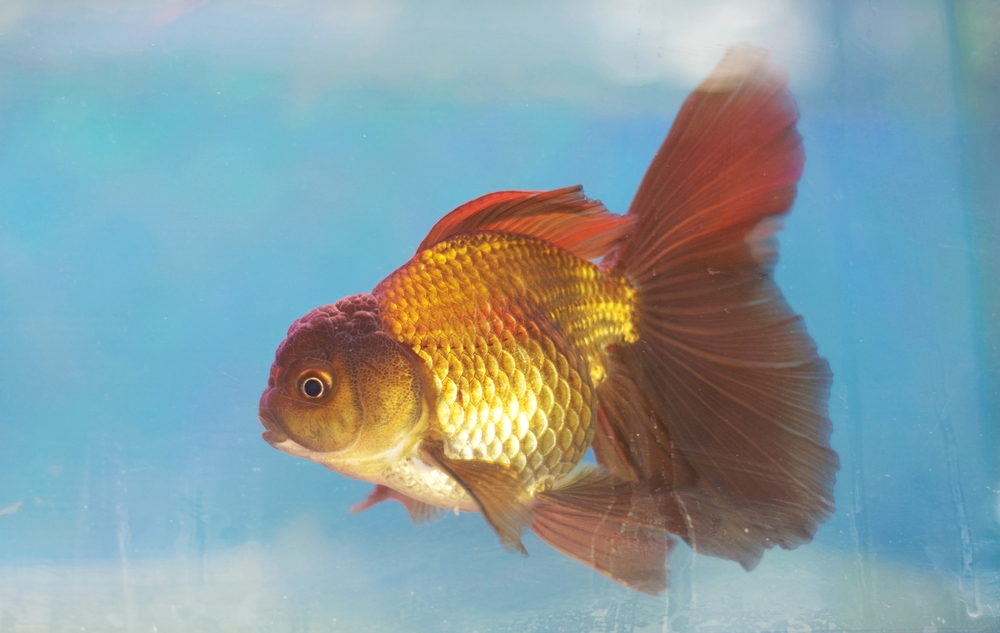
In this section, I address common concerns about feeding goldfish with food formulated for betta fish, including safety, risks, and nutritional adequacy.
Is it safe for goldfish to consume food made for betta fish?
It is generally safe for goldfish to consume betta food on an occasional basis as a temporary substitute when their regular diet is unavailable. However, it shouldn’t become a regular practice.
What are the potential risks of feeding goldfish betta-specific food?
Feeding goldfish betta food regularly may lead to nutritional imbalances. Betta food is typically higher in protein, which is not ideal for goldfish and may cause digestive issues or poor health over time.
Can the dietary requirements of goldfish be met with betta fish pellets?
Betta fish pellets do not meet the dietary requirements of goldfish as a staple diet. Goldfish require a varied diet that includes more carbohydrates and vegetation to thrive.
How does betta food affect the health and growth of goldfish?
Long-term feeding of betta food to goldfish can lead to health issues due to excess protein and lack of necessary fiber. This can affect their growth and lead to health complications.
Are there any nutritional benefits for goldfish when eating betta food?
While betta food may provide a high-protein snack for goldfish, it lacks the necessary nutrients goldfish need for a balanced diet. Therefore, the nutritional benefits are limited.
What alternative foods are suitable for goldfish if betta food is given occasionally?
Suitable alternatives for goldfish include sinking pellets, flakes formulated for goldfish, vegetables like peas and lettuce, and occasional live or frozen foods like bloodworms or brine shrimp to provide a balanced diet.

Ian Sterling, founder of Fishlab.com, began his aquarium journey over 30 years ago, driven by a deep fascination for fish and their diverse personalities. His website, Fishlab.com, is dedicated to making fishkeeping accessible and enjoyable, offering beginner-friendly guidance, expert insights, and a community for aquarists to connect and share experiences.


